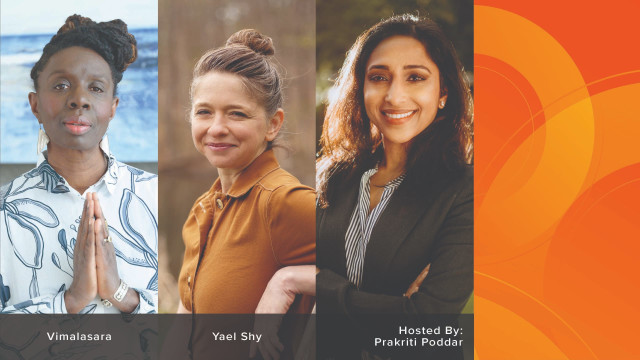My Life Changed From Meditation

Although Hector Marcel stumbled upon a meditation studio by accident, it felt like it was meant to be. Twenty-five years later, his decades of experience in formal meditation have given him the ability to take the awareness he generates on the cushion into all aspects of his life.
Here, Marcel talks about why Tibetan Buddhism makes so much sense, his deep appreciation for ice cream, and the two magic words of meditation.
Q: How did you first discover meditation?
A: Like everyone in their 20s, I came to a roadblock. Everything I thought would make me happy wasn't, so this was an accumulated thing. I was trying psychiatrists and coaching and struggled with depression and anxiety; we didn't call it those things back then — but my mind wasn't stable, and I couldn't settle it.
One night, I was on my way to a housewarming party and went into Three Jewels by mistake. They said, "We have free meditation classes." My mind went, "I haven't tried that." They asked me, "Do you think you have some control of your mind?" and I said, "Of course I do; it's my mind," and then the teacher said, "OK, let's try to stay on the sensation of the breath for 10 seconds."
I don't think I lasted a millisecond. I got stubborn about it — it was my consciousness, and I wanted to figure out how to direct my mind to do what I wanted it to do. Meditation became the investigation and the practice of expanding the capacity for choice.
Q: How did you find your meditation style, and why does it work so well for you?
A: I take the Tibetan Buddhist lineage very literally. They've got two and a half thousand years of literature that describes what meditation is and isn't, obstacles to meditation. They also offer a roadmap of how to overcome these obstacles.
Once I learned that I was like, "Oh my God, these people have figured out a schematic of how consciousness functions."
They taught me very early on that there are two types of meditation: concentrative and analytical. Single-pointed concentration, which leads to samatha, asks us to keep our mind on one thing for as long as possible. We all have that capacity, it's similar to being lost in a story, and your partner's calling you for dinner, and you don't hear them. It's getting to stillness single-pointedly.
The other one is analytical meditation, where you question the inside reality you experience when dealing with the outside world. That leads to wisdom. You get these realizations through analyzing: "Do I think I'm going to get happy when I have dulce de leche ice cream, or am I going to get fat?" You place your mind between two seemingly opposing things until, pop, you have an oh-my-goodness revelation: "I overeat ice cream, and I get fat."
You come to a realization, and then if you've developed the other type of meditation, you can stay in that realization, and it changes the way you perceive. Those two together are the primary practices, exactly what the Dalai Lama does.
Q: What are your favorite topics to focus on in your classes?
A: It depends on the audience. If I were unchained and could talk about anything, I would speak of karma and emptiness. These magic words are the key to every Buddhist practice. Karma and emptiness speak about the ultimate way things exist, the code behind the matrix. I also enjoy teaching love and compassion and deconstructing Buddhism.
Q: What does your daily meditation practice look like?
A: Because I teach so much, and I travel a bunch, the timing of my practice doesn't take priority as it used to; I do it whenever I have some free time. I also have fairly advanced visualizations that I've gotten after 25 years of being in a lineage, and they are particular, specific, and weird, so I do them when I can.
I don't just meditate on the cushion. The 25 years of practice enables me to remain with the awareness I generate during practice. The meditation follows me throughout the day. I can abide in a very different state and still do the transactional business things, but my mind is doing what I would be doing on the cushion. That's the point of meditation, to slow down your mind and see how it works with reality, so much so that it can show up for you off the cushion.
Q: Other than meditation, what do you do daily to feel your best?
A: Eat ice cream. That's a joke! (But really, dulce de leche ice cream is delicious.) Besides meditation, the understanding of the Buddhist view is what I'm all about. I don't care about anything else because it encompasses everything. Trying to understand how we perceive reality is just one slice.
There are other humans who have recorded a different way of understanding the world that includes your consciousness, your awareness, and so it doesn't just focus on the outside world; it focuses on the inside world. I geek out on that all the time — and I prefer to do it on retreat in tropical places like a beach.
Learn how to shift your perception through embracing contradiction in this guided course by meditation teacher Nithya Shanti.
Header photo: ImagineGolf/Getty Images
Key Takeaways:
- According to Buddhist lineage, there two types of meditation: concentrative and analytical.
- Karma and emptiness and key topics in a Buddhist practice.
- The point of meditating is to slow down your mind and see how it works with reality.







